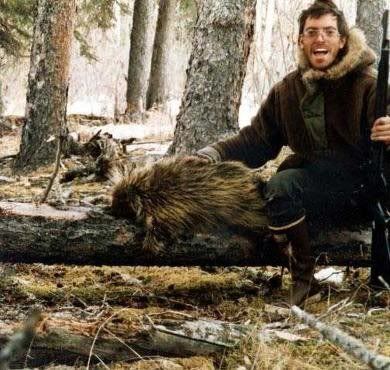The last blog got me thinking about (wo)man's inner conflict, namely my own inner turmoil. (Let's face it, I can't speak for others. All I know is "I think therefore I am.") Last semester I read a book, "Into the Wild". I find myself thinking about Chris McCandless randomly. In a desk staring at the chalk board, watching the snow flakes float from the sky, in awe of the blue mountains on the horizon, and talking with my friends about nothing. What would Chris do in this situation? What would he think of me? It's almost like I know him. Like I can conjure up a Chris McCandless spirit and chat with him. I see that smiling face holding a porcupine on his last fateful journey into the Alaskan wilderness, and it feels like I am not alone. There is someone who has suffered as much as me, and probably more.

Here is a man that really tried to live out "being one with nature".
The conflict that Steiner and many new age writers describe is what makes us depressed. All of us long for this "non-conflict" state, be it heaven or nirvana. We want this chaos to end. We want to throw away all these seemingly needless desires and longings and run away. Run away, like Chris, run away and maybe never return. When man first entered civilization he left behind the woes of needless death, of instability of the elements, of the horror of killing wild animals, but he also lost something. He lost being "one" with the world. Man lost his innocence, his figurative childhood. Adam and Eve left the garden and Enkidu entered the civilized world. One of complexities and conflict. One of walls between women and men, the old and young, death and life, the state and the individual, and most importantly, mortals and immortals. We lost the gods. We lost paradise.
And then, adding to this already huge weight, the horror of being alone on a rocky planet in the middle of nothing. To quote Karen Armstrong's book, A Short History of Myth, "The French mathematician Blaise Pascal (1623-62) ... was filled with horror when he contemplated the 'eternal silence' of the infinite universe opened up by modern science: 'When I see the blind and wretched state of men, when I survey the whole universe in its deadness, and man left to himself with no light, as though lost in this corner of the universe without knowing who put him there, what he has to do, or what will become of him when he dies, incapable of knowing anything, I am moved to terror, like a man transported in his sleep to some terrifying desert island, who wakes up quite lost, with no means of escape. Then I marvel that so wretched a state does not drive people to despair" (Armstrong 128). Quite a good sypnapsis of the show LOST actually.
But it is important to remember we are not aliens in a foreign world.
Our thoughts and our dreams and our realties are also the universe's thoughts, dreams, and realities. You, me, your family, my family, everyone we know, every piece of sand on a beach, every tree in the forest, every flittering butterfly, every flower blooming in the prairie, rabbit, dog, cat, mouse, demon, angel, and decaying body. And like the great Alan Watts said, 'the clammy foreign-feeling world of the ocean’s depths, the wastes of ice, the reptiles of the swamp, the spiders and scorpions, the deserts of lifeless planets... Our feelings about the crawling world of the wasps’ nest and the snake pit are feelings about hidden aspects of our own bodies and brains, and all of their potentialities for unfamiliar creeps and shivers, for unsightly diseases, and unimaginable pains.' Everything is one, the good and the bad, black and white, death and life, woman and man, light and dark, happy and sad. You are not a soul encaged inside a flesh prison. You weren't thrown into an alien world. An alien universe. You are part of this universe. You are this universe. Look around you, everything, everything in this room, it all came from earth, the sun, the galaxy, the universe. Stars, black holes, nebula clouds, exploding super novas and dying white dwarves, all you. All you. You didn't spring from no where. No. You are materials made of this planet. We all are.
Part II will confront civilization and the struggles of modern man.
No comments:
Post a Comment